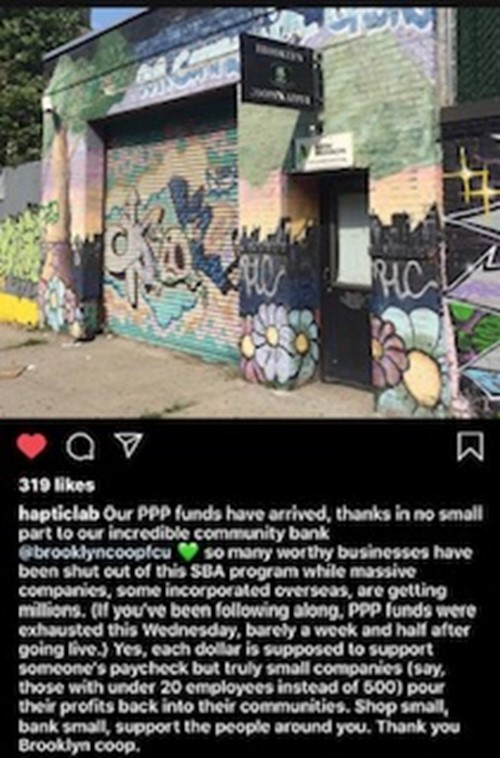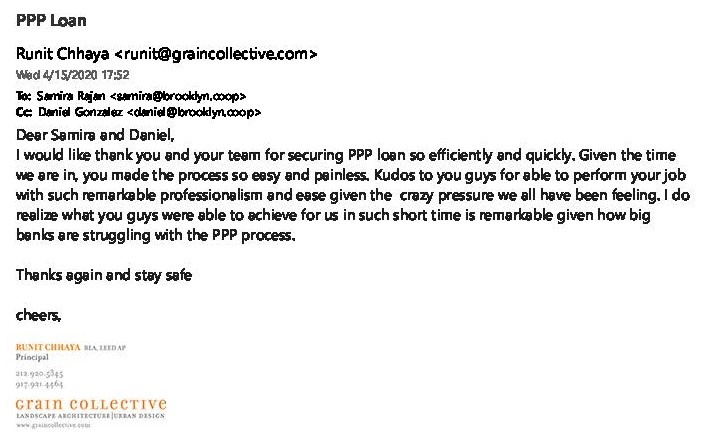Our PPP Loans
Posted by Samira Rajan @Jun 11 2020
From April 3 through May 7, Brooklyn Coop lent an unprecedented $6 million in Paycheck Protection Program (PPP) loans, an initiative passed by Congress in the CARES Act designed to support small businesses in a time of economic lockdown. To give some context, our total lending in the entire year of 2018 equaled $6 million, so to have processed and disbursed this sum in such a short time required an ‘all hands on deck’ approach. Azra, a member of the Grow Brooklyn staff, pitched in to help. In this guest blog post, she describes her experience and BCoop’s resulting PPP loan portfolio.
In 2018, I joined Grow Brooklyn as the Assistant Director. In my role I develop partnerships, support fundraising efforts and try to have a holistic understanding of how Grow Brooklyn and Brooklyn Coop’s programs work and who they aim to serve. However, nothing has been as poignant as delivering a direct service during these isolated times.
“Unprecedented” is the word most commonly used to describe the circumstances surrounding the COVID-19 pandemic. That same adjective is echoed in the influx of PPP applications Brooklyn Coop received from local nonprofits and small businesses starting on April 3. Once I learned the rate at which applications were being submitted to our Loans Team, I decided to offer an additional hand in processing the PPP loans.
| Average Loan Size | $48,200 |
| Average Loan under $10,000 | $4,445 |
| Average Loan over $200,000 | $232,199 |
| Loans to New Members | 88 |
| Loans to Existing Members | 38 |
| Average Age of Borrower | 43 years |
| Average Years in Business | 14.3 years |
| Oldest Business or Nonprofit | 163 years |
| Women Business Owners or Directors | 52% |
| Employees Assisted | 644 |
On April 8, my work began. Daniel, the Director of Lending, gave me a crash course into what we needed to move an applicant’s folder from processing to underwriting (where a Loan Officer would approve the loan). There was Form 1919, Form 2483, last two years of taxes, some bank statements, and all the usual proofs of ID. Of course, if there were joint owners for a business, we needed double the documents. If you were a nonprofit, additional detail about the signatory were required. While it all seemed pretty straightforward, every business operates so uniquely. The ways in which a 100-employee C Corp tracks payroll is very different from a 1 employee Sole Prop, a S Corp, or newly formed LLC.
Some applications came in complete; others were missing one signature or various statements, but I eventually memorized what I needed. I even became very comfortable with requesting the same document several times if an applicant was missing an initial in an inconspicuous place on a form. Just as we seemed to have our system running, the first round of funding dried up. I remember biking home that afternoon so defeated, knowing we would disappoint so many people, many of whom I got to know a little. The next day news stories talked about the PPP loans for Shake Shack and Ruth’s Chris while small businesses in our community were left hanging.
The time it took for Congress to agree on a second round of funding seemed to drag on forever. The Loan Officers worked tirelessly to ensure that, when the second wave of funds was authorized, all applicants in our queue would receive funds. I remained glued to my email from morning to night ready to move as many files as I could to the next phase.
In the end, Brooklyn Coop, a small but mighty financial institution, disbursed over $6 million dollars in PPP loans to 127 applicants, 99 of which were Brooklyn-based.
This high touch experience we provided made clear the major gap faced by business-owners in accessing and submitting the information needed to successfully apply for a loan. While big banks generated automatic responses, we directly communicated what was missing from a file. For example: right before the first round of funding ran out, the SBA modified its requirements making it mandatory that all Sole Props submitted their 2019 Schedule C. We emailed and called each applicant directly requesting the form and explained the process for retrieving it if they had not yet filed their 2019 taxes. This open line of communication was critical because it allowed us to disburse loans from $250,000 to $500 to small businesses of varying capacities when it came to English proficiency, digital literacy or income.


Over the last month we have received numerous thank you notes and social media posts about the high touch experience Brooklyn Coop was able to facilitate given the situation. Over and over people have expressed how appreciative they are to be able to talk to real people, not a recording, how quickly they were able to access their funds, and how thankful they were that we remained open and accessible. This experience has made it even more glaringly obvious why we exist and why these services are needed.
 Samira Rajan is the longest-serving employee of Brooklyn Coop and currently the Director of both the credit union and Grow Brooklyn. She started here as an Americorp*VISTA for a single year of service back when we were Bushwick Coop in 2001, got hooked by the challenge of building a community financial institution, and hasn’t left.
Samira Rajan is the longest-serving employee of Brooklyn Coop and currently the Director of both the credit union and Grow Brooklyn. She started here as an Americorp*VISTA for a single year of service back when we were Bushwick Coop in 2001, got hooked by the challenge of building a community financial institution, and hasn’t left.
